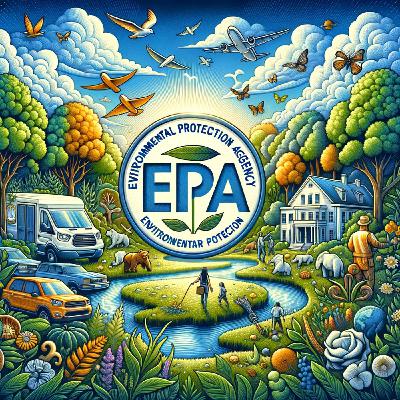EPA's Biggest Deregulatory Move Sparks Debate on Climate, Air Quality, and US Competitiveness
Update: 2025-09-22
Description
EPA rocked the headlines this week with what’s being called the biggest deregulatory action in US history. On Wednesday, EPA Administrator Lee Zeldin announced the agency will initiate 31 sweeping rule changes, targeting energy, air, and climate regulations—the sharpest departure from previous climate policy in decades. At the heart of this move is the proposed repeal of greenhouse gas emissions standards for fossil fuel-fired power plants. According to recent coverage from Kirkland & Ellis, the new rules reinterpret the Clean Air Act and claim fossil-fuel plants do not significantly contribute to regulated air pollution, undoing key Obama and Biden-era carbon limits. As a result, if finalized, the legal footing for many existing EPA climate regulations could vanish, from power plants to vehicle emissions, sending shockwaves through environmental circles.
The EPA’s deregulatory push stems from Executive Order 14154, titled “Unleashing American Energy,” urging agencies to strip away rules seen as obstacles to domestic energy sources like coal, oil, natural gas, and nuclear. In parallel, EPA also extended deadlines for the oil and gas sector to comply with the Biden-era methane rule, granting more time for states and operators to limit emissions from existing sources. These changes, outlined on the EPA’s own site, mark a hard turn in regulatory approach and have sparked intense debate among environmental advocates, scientists, and industry leaders.
For everyday Americans, the impact could be immediate and far-reaching. Harvard’s School of Public Health warns that rolling back air quality regulations may increase rates of respiratory illness, especially for children and vulnerable populations. Businesses, particularly those in energy and heavy industry, stand to see reduced compliance costs and expanded operational freedom, which some CEOs praise as a boost for US competitiveness. But for states, especially those with climate-focused policies, the loss of federal standards calls their authority and environmental strategies into question. Legal challenges are already brewing; environmental groups signal lawsuits if the Endangerment Finding is repealed, arguing that EPA’s own advisory boards and new National Academies reports still cite strong scientific consensus on the health threats of emissions.
Internationally, analysts say the rollback could undermine US climate commitments and weaken global partnerships, especially ahead of key summits this fall. EPA spokespersons say the agency remains “committed to transparency,” pointing listeners to the upcoming public webinar on September 30 where officials will answer questions and present details on these changes. Citizens can get involved by submitting public comments during the regulatory review period—EPA is actively seeking feedback on the proposed rules before finalization. If you want your voice heard, now is the time to engage.
Looking ahead, listeners should watch for Congressional hearings, court challenges, and further EPA notices in coming weeks. For more information and updates, visit the EPA’s official site and register for the September 30 webinar. Finally, your input matters. Participate in public comment periods and connect with local leaders to help shape the future of US environmental policy.
Thanks for tuning in. Don’t forget to subscribe to stay informed. This has been a Quiet Please production, for more check out quiet please dot ai.
For more http://www.quietplease.ai
Get the best deals https://amzn.to/3ODvOta
This content was created in partnership and with the help of Artificial Intelligence AI
The EPA’s deregulatory push stems from Executive Order 14154, titled “Unleashing American Energy,” urging agencies to strip away rules seen as obstacles to domestic energy sources like coal, oil, natural gas, and nuclear. In parallel, EPA also extended deadlines for the oil and gas sector to comply with the Biden-era methane rule, granting more time for states and operators to limit emissions from existing sources. These changes, outlined on the EPA’s own site, mark a hard turn in regulatory approach and have sparked intense debate among environmental advocates, scientists, and industry leaders.
For everyday Americans, the impact could be immediate and far-reaching. Harvard’s School of Public Health warns that rolling back air quality regulations may increase rates of respiratory illness, especially for children and vulnerable populations. Businesses, particularly those in energy and heavy industry, stand to see reduced compliance costs and expanded operational freedom, which some CEOs praise as a boost for US competitiveness. But for states, especially those with climate-focused policies, the loss of federal standards calls their authority and environmental strategies into question. Legal challenges are already brewing; environmental groups signal lawsuits if the Endangerment Finding is repealed, arguing that EPA’s own advisory boards and new National Academies reports still cite strong scientific consensus on the health threats of emissions.
Internationally, analysts say the rollback could undermine US climate commitments and weaken global partnerships, especially ahead of key summits this fall. EPA spokespersons say the agency remains “committed to transparency,” pointing listeners to the upcoming public webinar on September 30 where officials will answer questions and present details on these changes. Citizens can get involved by submitting public comments during the regulatory review period—EPA is actively seeking feedback on the proposed rules before finalization. If you want your voice heard, now is the time to engage.
Looking ahead, listeners should watch for Congressional hearings, court challenges, and further EPA notices in coming weeks. For more information and updates, visit the EPA’s official site and register for the September 30 webinar. Finally, your input matters. Participate in public comment periods and connect with local leaders to help shape the future of US environmental policy.
Thanks for tuning in. Don’t forget to subscribe to stay informed. This has been a Quiet Please production, for more check out quiet please dot ai.
For more http://www.quietplease.ai
Get the best deals https://amzn.to/3ODvOta
This content was created in partnership and with the help of Artificial Intelligence AI
Comments
In Channel





